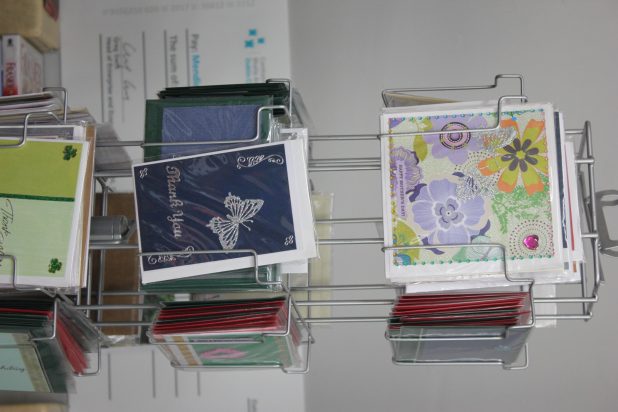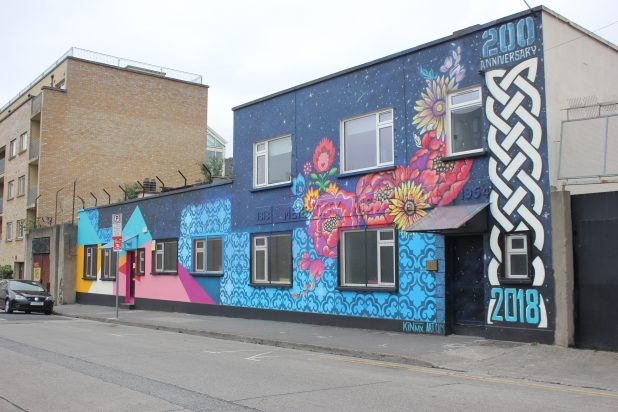The Mendicity Institute recently commemorated 200 years of its foundation in Dublin. For the vast majority of us (myself included) it was a garrison held by the rebels during easter week and our knowledge of what it actually is and does goes no further than that. The word mendicity is the same as mendicancy (i.e. begging), and the Mendicity Institution was originally founded for ‘the suppression of street begging in Dublin. The ‘Mendo’ as it is called colloquially was originally founded after a particularly severe winter in 1816 compounded the misery of the poor. Inspired by the work done by philanthropists in Hamburg, Munich, Belfast, and Edinburgh, Dublin businessmen called a public meeting that was held in the Mansion House on 23rd May 1817. The public was told that an organisation such as the one in Edinburgh could save half the amount of 100, 000 spent annually in answering the demands of beggars on the street. The plan based on models operating in the aforementioned cities, was to support beggars at subsistence levels while training them for simple employment and encouraging good industrious habits, so that they might recover their strength and purpose sufficient to reassert their independence. The revealed law, the Association maintained is that he who will not work, will not eat. It was also held that parents should support their children and adult children should support their aged parents. Every care was taken that the employment of beggars would not interfere with the normal channels of employment and take work away from others. Some worked carrying placards through the streets of Dublin, imploring the public not to give alms but to donate to the Mendicity Institution instead. Some were employed as carters to collect leftover food from houses in the city, to add to the pot. This is the text that the inspectors employed by the Mendicity read out to (or handed to) those they saw begging: Friendly Notice to all Beggars
“If you are found begging in the street after this notice, you will be taken up and punished under the law, therefore if you really have no other means of sustenance, go to the Mendicity Asylum, you will get work and food. If you are unable to work you will be supported and if you have children they will be clothed, fed and educated. Then why disgrace yourselves, or cruelly expose your children to misery and ruin by continuing to beg.”
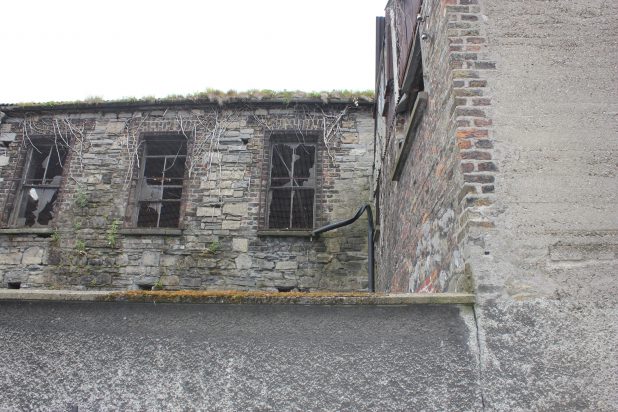
If you don’t work, you don’t eat!
This was the harsh dictum of the Mendicity Institution; however, in reality it helped those who were incapable of work, the young, the aged and the infirm. The Mendicity was only open to people who had normally been resident within the ring of the two circular roads for three months. The intention was that the able bodied could earn enough in the Mendicity over and above what they were charged for their food in order to pay for their lodgings. In order not to break up families there was a girls and a boys school. By the end of 1818 there were 2,930 attending – apart from those working at the various tasks there were 282 children in school, 319 elderly and infirm and 400 younger children. It is iportant to note that though fever was rampant in the winter 1818-1819 the Institution remained remarkably free from disease, a situation attributed to the improved diet of the mendicants.
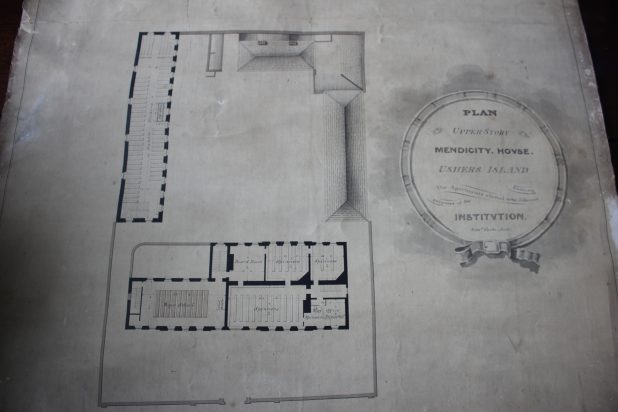
Funding was vital and the city was divided into 60 ‘walks’ and collectors were appointed, so that all Dublin’s 12,000 or so houses would be visited and donations requested. The affairs of the Association were managed by a committee of sixty and by a president, vice presidents, and secretaries – all of whom acted voluntarily. There were many well known people on the original management committee, names that would inspire confidence including a Bewley, a Guinness, a La Touche, a de Vesci, and an Orpen. The patron was the Lord Lieutenant, the president was The Lord Mayor, the vice presidents included dukes, judges, archbishops and generals. Premises in Hawkins St were leased from the RDS. Within a few years the Mendicity Institution had moved via Copper Alley into Moira House at Usher’s Island. This was a once beautiful stately home. Neighbours were assured that there would be a wall erected between the house and the river and that the riverside entrance would be denied to mendicants who had to use the Island St entrance.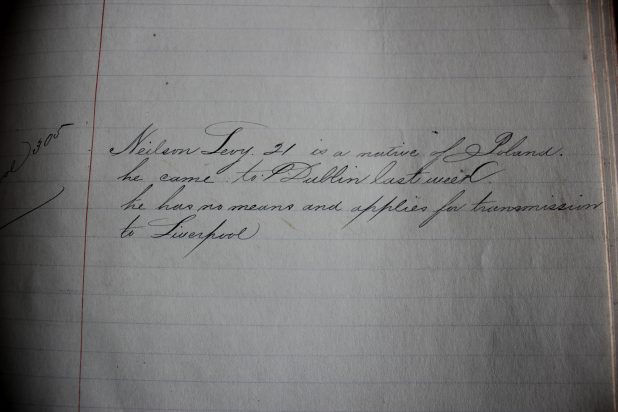
As well as taking beggars off the streets, those who were destitute were helped to travel to places, where they had a promise of employment, or to be reunited with friends or family that would be able to support them. Those applying for transmission were required to labour in the Mendicity Institution for four weeks, while their cases were investigated. That generally sorted out the deserving from the undeserving, but written references and proofs or undertaking were required from local clergymen, police or prospective employers before the tickets were purchased, generally at a discount from the various steam packet and railway companies. Generally, the transmissions were to other parts of Ireland or to England, but there were a couple of French plumbers who wound up in Dublin, some Poles and a Russian sailor who missed his boat in Galway. Between June and December 1818, over 2,600 people were transmitted. The service continued until 1969 when Paddy Power, a 23-year-old living in The Iveagh Hostel applied for the fare to Navan for where he had a letter of admission for an operation. The final note in the transmissions book reads, ‘cancelled – did not turn up for bus.’ It is very similar to the service provided today for the eastern European migrants who make up 85 to 90 percent of applicants to the Institute.
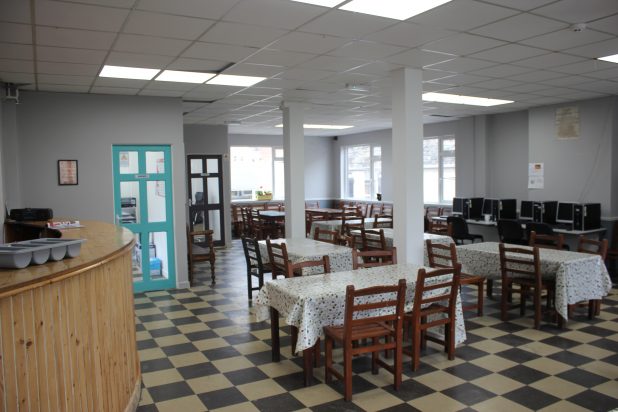
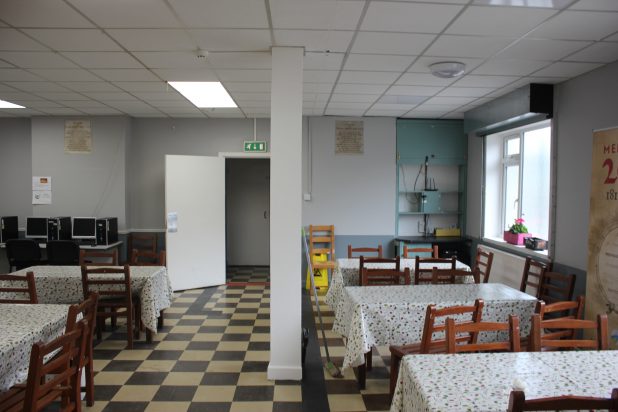
Louisa Santoro, CEO of the Institute, brought me on a tour of their facilities and explained to me the current mission of the institute and the work they do. ” We run a food service 6 days a week for about 50 to 70 people per day. Breakfast is between 9/930 and reopens for lunch at ten and remains open until 2 with food served until 1pm. The vast majority of current service users do not have english as a first language and this is one of the main reasons why they attend the center. there are a number of rooms adjoining the dining hall to provide users with some privacy when seeking advice”. The Institutes’ workshops teaches many of its user new skills, English being a main subject, with basic woodworking and some metal work. Finished products are sold at some markets in the Dublin area and on their etsy store via https://www.etsy.com/shop/MendicityInstitution
In addition to this they also provide the following services
Legal employment, through work sessions twice per week
Support for Detox/rehab treatment (sobriety is an absolute must)
Referrals for priority emergency accommodation/housing
Assistance with up-skilling courses such as Manual Handling, Safe Pass, etc.
Personalised assistance with all aspects of overcoming marginalisation:
Procuring documents – passport and/or national cards – as a result of having developed excellent relationships with various embassies.
Revenue Office registrations.
Opening bank account.
Various applications: medical cards, social housing, etc.
Searching for private rented accommodation.
Facilitation of (re)integration, through linking the Workshop participants with our Employment and TELL programmes which lead to accessing opportunities for full-time work through personalised job seeking care and connection with local community.
Collaboration with local employment centres.
The Institute is currently seeking volunteers so if you would like to get involved, please contact them at 01 677 3308 or info@mendicity.org.


